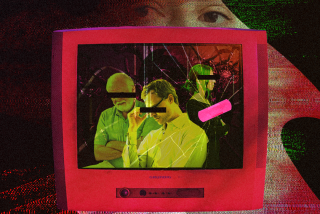N Word Should Be Odious From Anyone
- Share via
Two recent events, one in a California courtroom and one in the social sciences, call attention to the effects of cultural racism on the psychological well-being of black Americans.
In the Glendale municipal court system a white court commissioner’s career was shaken by the injudicious use of the N word , a longstanding racial epithet directed against Africans and African-Americans. While it is appropriate to vigorously censure the use of the N word , particularly by those who operate within the public trust, it is even more important to examine the frequency of its use within the broader social culture.
Name-calling is a tactic for maintaining intergroup schisms. It simultaneously simplifies the world, elevates one’s own group and dehumanizes others. The N word was invented to stereotype its targets and to justify slavery and racial discrimination. It was intended to connote lazy, shiftless, stupid, animalistic, trifling and other negative attributes.
Most would agree that the N word is an ugly and offensive racial slur. Nevertheless, its use is common in America. Most significant is its use among blacks. As African-Americans, we cannot tolerate racial epithets on the part of the whites or others, but even more intolerable should be the use of the same epithets by ourselves. Yet the N word is one of the most frequently used words in the black community.
Some say that the use of the N word among blacks is due to its “endearing” qualities. But other terms of endearment could and should be used that don’t carry the same negative cultural baggage. The truth is that this word is most often used to disparage its targets, regardless of the ethnicity of the speaker. The persistent viability of the N word in the black community is a scar from centuries of cultural racism.
The second significant event in this context occurred at the recent meeting of the American Psychological Assn. in New York, where papers by Darlene PowellHopson and Sharon McNichol revealed that samples of black children in the United States and in Trinidad generally preferred white dolls over black dolls. These findings replicated the influential research by Kenneth Clark and Mamie Clark of more than 40 years ago.
The Clarks’ research was instrumental in the 1954 Supreme Court decision calling for the desegregation of American schools. They concluded from their studies of doll preferences that segregation produced harmful psychological effects in black children. It is disturbing to see that these effects endure 40 years after the original finding.
Although social-science evidence on doll preferences has shifted over the course of time--blacks were more likely to select the black doll during the “black-is-beautiful” late 1960s--the recent studies are not surprising. Other cultural indicators in the black community suggest an increased adoption of non-black cultural values.
In particular, important black role models are “de-Africanizing” their personal appearances through cosmetic surgery, colored contact lenses and modifications in hair style and hair color. Among black men and women we witness far more imitations of European or white American styles than African or African-American ones, be it pop star Michael Jackson’s narrowed nose or television host Oprah Winfrey’s newly greenish eyes.
This rejection of Africanness is not surprising, given the low quantity and poor quality of African-American images in the mass media. Blacks are severely under-represented in the media, and are too frequently portrayed in derogatory or stereotypical ways. Blacks’ self-rejection, therefore, mirrors their rejection by the broader society.
It is in this way that these two events--the frequent use of the N word and black children’s preference for a white doll over a black one--are connected. They are reminders of the psychological damage done by racist cultural practices. The costs associated with this damage are considerable, and may be reflected in drug abuse, suicide, homicide or black-on-black crime and violence.
Reversing centuries of racism is necessarily a long-term process. A need exists to reinstill black pride and black consciousness in the black population. Positive African images must be propagated in the media so that children will once again select the black doll.
The use of the N word should be made at least as odious as bad breath or body odor. Everyone should refrain from its use and provide negative sanctions on its use by others. This banning of the N word and all other epithets like it would have the positive effect of directly addressing instances of personal and cultural racism. Our consciousness will be raised by placing this almost unconscious cultural practice at the front of our attention.
More to Read
Sign up for Essential California
The most important California stories and recommendations in your inbox every morning.
You may occasionally receive promotional content from the Los Angeles Times.













